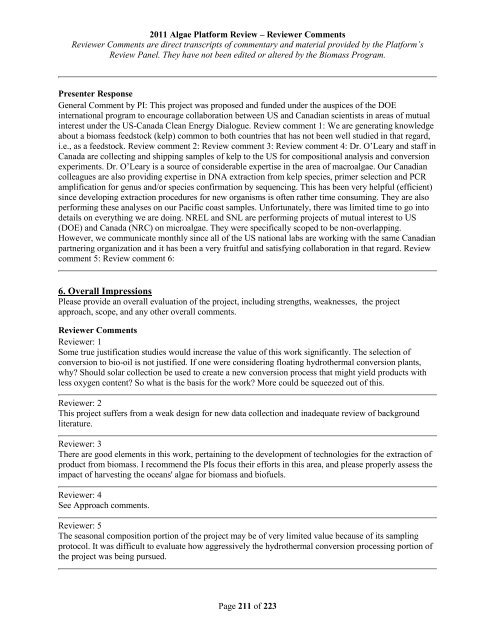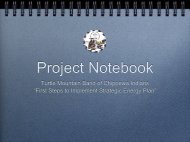Reviewer Comments - EERE
Reviewer Comments - EERE
Reviewer Comments - EERE
Create successful ePaper yourself
Turn your PDF publications into a flip-book with our unique Google optimized e-Paper software.
2011 Algae Platform Review – <strong>Reviewer</strong> <strong>Comments</strong><br />
<strong>Reviewer</strong> <strong>Comments</strong> are direct transcripts of commentary and material provided by the Platform’s<br />
Review Panel. They have not been edited or altered by the Biomass Program.<br />
Presenter Response<br />
General Comment by PI: This project was proposed and funded under the auspices of the DOE<br />
international program to encourage collaboration between US and Canadian scientists in areas of mutual<br />
interest under the US-Canada Clean Energy Dialogue. Review comment 1: We are generating knowledge<br />
about a biomass feedstock (kelp) common to both countries that has not been well studied in that regard,<br />
i.e., as a feedstock. Review comment 2: Review comment 3: Review comment 4: Dr. O’Leary and staff in<br />
Canada are collecting and shipping samples of kelp to the US for compositional analysis and conversion<br />
experiments. Dr. O’Leary is a source of considerable expertise in the area of macroalgae. Our Canadian<br />
colleagues are also providing expertise in DNA extraction from kelp species, primer selection and PCR<br />
amplification for genus and/or species confirmation by sequencing. This has been very helpful (efficient)<br />
since developing extraction procedures for new organisms is often rather time consuming. They are also<br />
performing these analyses on our Pacific coast samples. Unfortunately, there was limited time to go into<br />
details on everything we are doing. NREL and SNL are performing projects of mutual interest to US<br />
(DOE) and Canada (NRC) on microalgae. They were specifically scoped to be non-overlapping.<br />
However, we communicate monthly since all of the US national labs are working with the same Canadian<br />
partnering organization and it has been a very fruitful and satisfying collaboration in that regard. Review<br />
comment 5: Review comment 6:<br />
6. Overall Impressions<br />
Please provide an overall evaluation of the project, including strengths, weaknesses, the project<br />
approach, scope, and any other overall comments.<br />
<strong>Reviewer</strong> <strong>Comments</strong><br />
<strong>Reviewer</strong>: 1<br />
Some true justification studies would increase the value of this work significantly. The selection of<br />
conversion to bio-oil is not justified. If one were considering floating hydrothermal conversion plants,<br />
why? Should solar collection be used to create a new conversion process that might yield products with<br />
less oxygen content? So what is the basis for the work? More could be squeezed out of this.<br />
<strong>Reviewer</strong>: 2<br />
This project suffers from a weak design for new data collection and inadequate review of background<br />
literature.<br />
<strong>Reviewer</strong>: 3<br />
There are good elements in this work, pertaining to the development of technologies for the extraction of<br />
product from biomass. I recommend the PIs focus their efforts in this area, and please properly assess the<br />
impact of harvesting the oceans' algae for biomass and biofuels.<br />
<strong>Reviewer</strong>: 4<br />
See Approach comments.<br />
<strong>Reviewer</strong>: 5<br />
The seasonal composition portion of the project may be of very limited value because of its sampling<br />
protocol. It was difficult to evaluate how aggressively the hydrothermal conversion processing portion of<br />
the project was being pursued.<br />
Page 211 of 223




